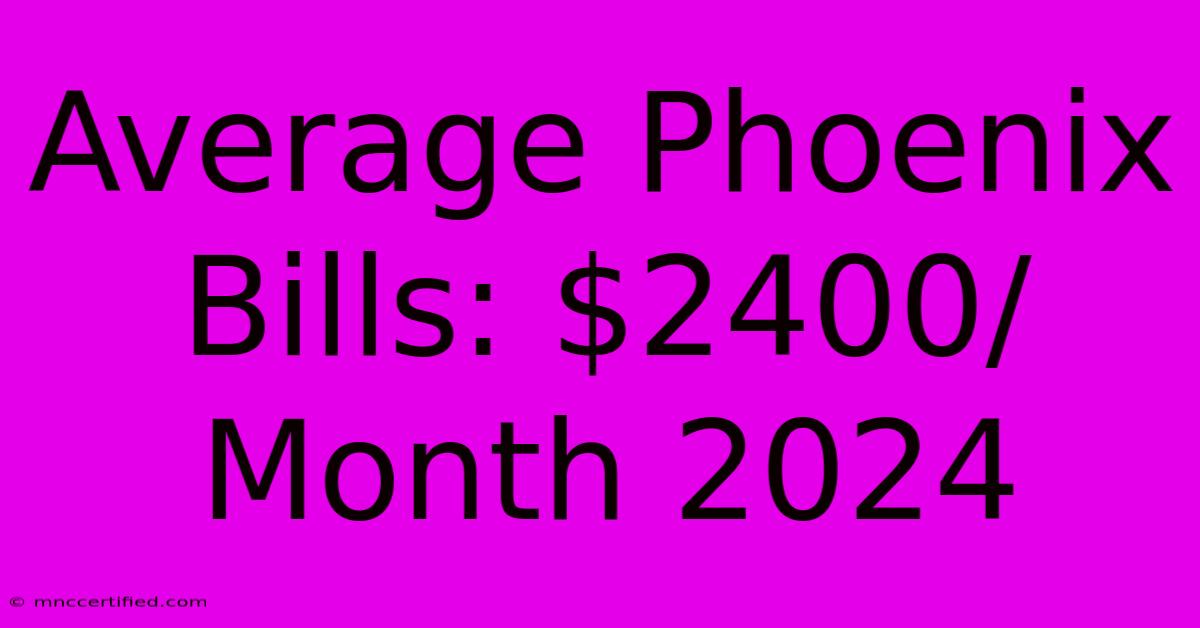Average Phoenix Bills: $2400/Month 2024

Table of Contents
Average Phoenix Bills: $2400/Month in 2024? A Deep Dive into Cost of Living
The statement "Average Phoenix bills: $2400/month in 2024" is a bold claim, and while it might be true for some Phoenix residents, it's crucial to unpack what contributes to such a high monthly expense and whether it represents a typical cost of living in the city. This article will delve into the various factors influencing monthly expenses in Phoenix, providing a realistic picture of what residents can expect in 2024.
Deconstructing the $2400/Month Figure
A $2400 monthly bill likely encompasses far more than just utilities. Let's break down the potential components:
Housing: The Largest Expense
Housing costs in Phoenix are a significant driver of overall expenses. Rent and mortgage payments vary drastically depending on location, size, and amenities. A luxury apartment in central Phoenix will undoubtedly command a far higher price than a smaller home in a suburb. While some might pay significantly less, others exceed this figure solely based on housing. Factors influencing housing costs include:
- Location: Central Phoenix and desirable neighborhoods command higher prices.
- Property type: Single-family homes, townhouses, and apartments all have different price ranges.
- Size and amenities: Larger homes with updated amenities naturally cost more.
- Market conditions: The fluctuating Phoenix real estate market plays a crucial role.
Utilities: Water, Electricity, and More
Utilities represent another substantial portion of monthly expenses. Phoenix’s hot climate necessitates significant air conditioning use, driving up electricity bills, particularly during summer months. Water usage also impacts costs. Consider these factors:
- Electricity: High summer temperatures mean higher electricity bills. Consider energy-efficient appliances and practices.
- Water: Arizona’s desert climate necessitates responsible water usage, which can still impact monthly bills.
- Gas: Natural gas usage for heating and cooking adds to overall utility costs.
- Trash and recycling: Municipal services vary in cost across different areas.
- Internet and cable: These essential services are also contributing factors.
Transportation: Car Ownership vs. Public Transit
Transportation costs are highly variable. Car ownership includes payments, insurance, gas, maintenance, and repairs. Public transportation is available but may not be suitable for all commutes. Consider these elements:
- Car ownership: This often represents the largest transportation expense.
- Public transportation: A more affordable, albeit potentially less convenient, option.
- Fuel costs: Fluctuating gas prices directly affect transportation expenses.
Groceries and Food: Eating Out vs. Home Cooking
Food expenses vary widely depending on dietary habits and choices. Eating out frequently will inflate costs compared to home cooking.
- Grocery shopping: The cost of groceries varies based on choices and store selection.
- Eating out: Dining out can significantly increase monthly food costs.
Healthcare: Insurance and Out-of-Pocket Expenses
Healthcare expenses are a critical consideration. Insurance premiums, deductibles, and co-pays can be substantial.
- Health insurance: The cost of health insurance varies greatly depending on the plan.
- Medical expenses: Unexpected medical bills can significantly impact monthly budgets.
Is $2400 Realistic? A More Balanced View
While some Phoenix residents may indeed spend $2400 or more monthly on bills, it's not representative of the average. This figure likely reflects a higher standard of living, perhaps including luxury housing and significant discretionary spending. For many, a more realistic budget might be lower, particularly those in more affordable housing or with different lifestyles. The key takeaway is that the cost of living in Phoenix varies significantly, and a more accurate picture requires a detailed breakdown of individual expenses.
Tips for Managing Your Phoenix Bills
- Budgeting: Create a detailed budget to track income and expenses.
- Energy efficiency: Implement energy-saving strategies to reduce utility bills.
- Affordable housing: Explore different neighborhoods to find more affordable housing options.
- Transportation planning: Consider alternative transportation methods like public transit or carpooling.
- Meal planning: Plan meals to reduce grocery expenses and avoid eating out frequently.
This in-depth analysis provides a nuanced perspective on Phoenix's cost of living. While $2400 per month might be a reality for some, it's essential to understand the contributing factors and consider a more realistic budgeting approach. By carefully considering all expenses, Phoenix residents can effectively manage their finances and enjoy the vibrant city life.

Thank you for visiting our website wich cover about Average Phoenix Bills: $2400/Month 2024. We hope the information provided has been useful to you. Feel free to contact us if you have any questions or need further assistance. See you next time and dont miss to bookmark.
Featured Posts
-
Olivia Hussey Romeo And Juliet Star Passes Away
Dec 28, 2024
-
Pavia Vs Haynes Georgia Tech Vanderbilt Prediction
Dec 28, 2024
-
Oklahoma Navy Prediction Horvaths Impact
Dec 28, 2024
-
Olivia Hussey 73 Romeo And Juliet Actress Dies
Dec 28, 2024
-
Mavericks Vs Suns Game Highlights
Dec 28, 2024